An official website of the United States government
 United States Department of Labor
United States Department of Labor
Evaluate materials and develop machinery and processes to manufacture materials for use in products that must meet specialized design and performance specifications. Develop new uses for known materials. Includes those engineers working with composite materials or specializing in one type of material, such as graphite, metal and metal alloys, ceramics and glass, plastics and polymers, and naturally occurring materials. Includes metallurgists and metallurgical engineers, ceramic engineers, and welding engineers.
Employment estimate and mean wage estimates for Materials Engineers:
| Employment (1) | Employment RSE (3) |
Mean hourly wage |
Mean annual wage (2) |
Wage RSE (3) |
|---|---|---|---|---|
| 24,740 | 2.5 % | $ 48.34 | $ 100,550 | 0.9 % |
Percentile wage estimates for Materials Engineers:
| Percentile | 10% | 25% | 50% (Median) |
75% | 90% |
|---|---|---|---|---|---|
| Hourly Wage | $ 27.87 | $ 35.55 | $ 45.98 | $ 59.42 | $ 74.20 |
| Annual Wage (2) | $ 57,970 | $ 73,950 | $ 95,640 | $ 123,590 | $ 154,340 |
Industries with the highest published employment and wages for Materials Engineers are provided. For a list of all industries with employment in Materials Engineers, see the Create Customized Tables function.
Industries with the highest levels of employment in Materials Engineers:
| Industry | Employment (1) | Percent of industry employment | Hourly mean wage | Annual mean wage (2) |
|---|---|---|---|---|
| Architectural, Engineering, and Related Services | 3,520 | 0.23 | $ 48.44 | $ 100,760 |
| Aerospace Product and Parts Manufacturing | 3,110 | 0.59 | $ 55.84 | $ 116,150 |
| Scientific Research and Development Services | 1,590 | 0.21 | $ 52.53 | $ 109,260 |
| Federal Executive Branch (OEWS Designation) | 1,460 | 0.07 | $ 58.47 | $ 121,610 |
| Management of Companies and Enterprises | 1,030 | 0.04 | $ 48.45 | $ 100,770 |
Industries with the highest concentration of employment in Materials Engineers:
| Industry | Employment (1) | Percent of industry employment | Hourly mean wage | Annual mean wage (2) |
|---|---|---|---|---|
| Iron and Steel Mills and Ferroalloy Manufacturing | 830 | 1.00 | $ 40.85 | $ 84,960 |
| Metal Ore Mining | 310 | 0.76 | $ 44.54 | $ 92,640 |
| Nonferrous Metal (except Aluminum) Production and Processing | 370 | 0.62 | $ 43.77 | $ 91,040 |
| Aerospace Product and Parts Manufacturing | 3,110 | 0.59 | $ 55.84 | $ 116,150 |
| Pipeline Transportation of Crude Oil | 70 | 0.59 | $ 62.71 | $ 130,440 |
Top paying industries for Materials Engineers:
| Industry | Employment (1) | Percent of industry employment | Hourly mean wage | Annual mean wage (2) |
|---|---|---|---|---|
| Oil and Gas Extraction | 80 | 0.07 | $ 66.16 | $ 137,620 |
| Pipeline Transportation of Crude Oil | 70 | 0.59 | $ 62.71 | $ 130,440 |
| Federal Executive Branch (OEWS Designation) | 1,460 | 0.07 | $ 58.47 | $ 121,610 |
| Remediation and Other Waste Management Services | 40 | 0.02 | $ 56.77 | $ 118,090 |
| Chemical Manufacturing (3251, 3252, 3253, and 3259 only) | 610 | 0.17 | $ 56.02 | $ 116,510 |
States and areas with the highest published employment, location quotients, and wages for Materials Engineers are provided. For a list of all areas with employment in Materials Engineers, see the Create Customized Tables function.
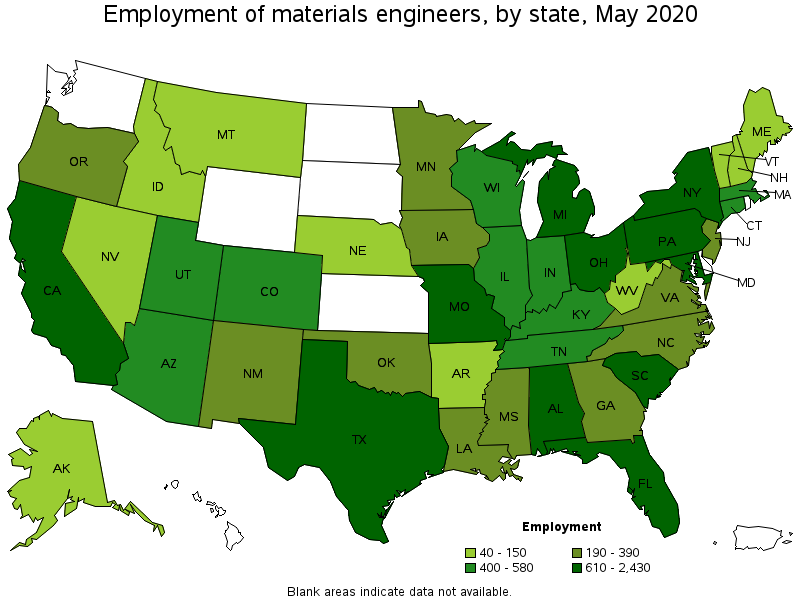
States with the highest employment level in Materials Engineers:
| State | Employment (1) | Employment per thousand jobs | Location quotient (9) | Hourly mean wage | Annual mean wage (2) |
|---|---|---|---|---|---|
| California | 2,430 | 0.15 | 0.83 | $ 53.23 | $ 110,710 |
| Texas | 2,300 | 0.19 | 1.07 | $ 52.27 | $ 108,710 |
| Ohio | 2,130 | 0.41 | 2.33 | $ 43.98 | $ 91,470 |
| Pennsylvania | 1,600 | 0.29 | 1.63 | $ 46.59 | $ 96,900 |
| Michigan | 1,060 | 0.27 | 1.51 | $ 39.56 | $ 82,280 |
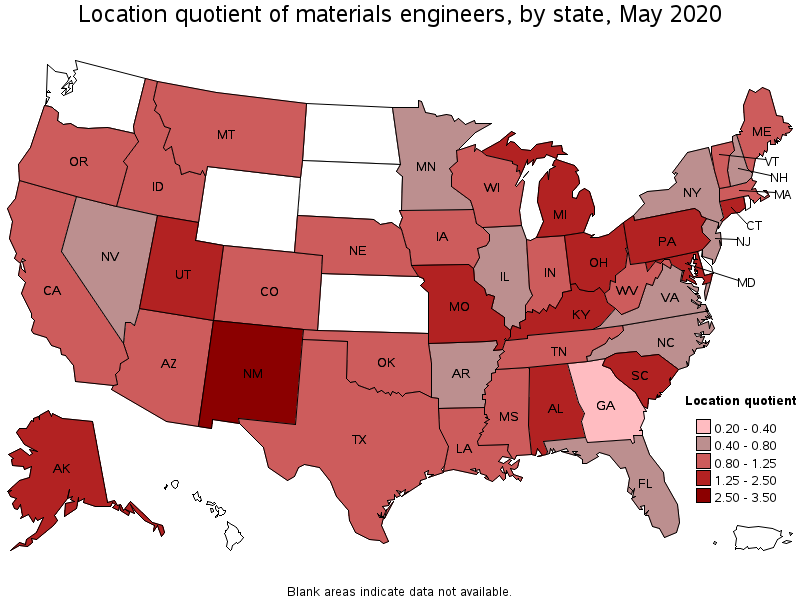
States with the highest concentration of jobs and location quotients in Materials Engineers:
| State | Employment (1) | Employment per thousand jobs | Location quotient (9) | Hourly mean wage | Annual mean wage (2) |
|---|---|---|---|---|---|
| New Mexico | 390 | 0.50 | 2.80 | $ 60.59 | $ 126,020 |
| Alabama | 790 | 0.42 | 2.34 | $ 45.13 | $ 93,880 |
| Ohio | 2,130 | 0.41 | 2.33 | $ 43.98 | $ 91,470 |
| South Carolina | 750 | 0.37 | 2.10 | $ 39.76 | $ 82,690 |
| Utah | 480 | 0.32 | 1.80 | $ 41.43 | $ 86,160 |
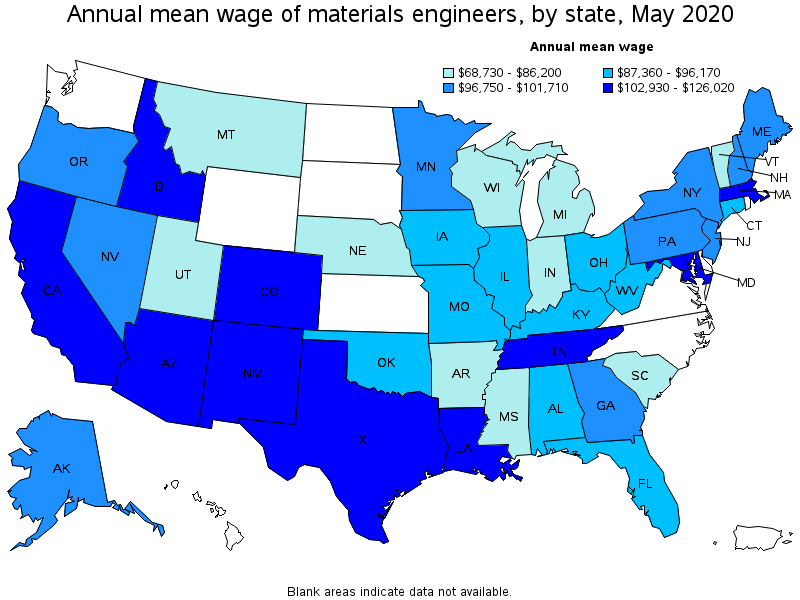
Top paying states for Materials Engineers:
| State | Employment (1) | Employment per thousand jobs | Location quotient (9) | Hourly mean wage | Annual mean wage (2) |
|---|---|---|---|---|---|
| New Mexico | 390 | 0.50 | 2.80 | $ 60.59 | $ 126,020 |
| Maryland | 810 | 0.32 | 1.79 | $ 59.25 | $ 123,250 |
| Louisiana | 270 | 0.15 | 0.85 | $ 53.86 | $ 112,020 |
| California | 2,430 | 0.15 | 0.83 | $ 53.23 | $ 110,710 |
| Texas | 2,300 | 0.19 | 1.07 | $ 52.27 | $ 108,710 |
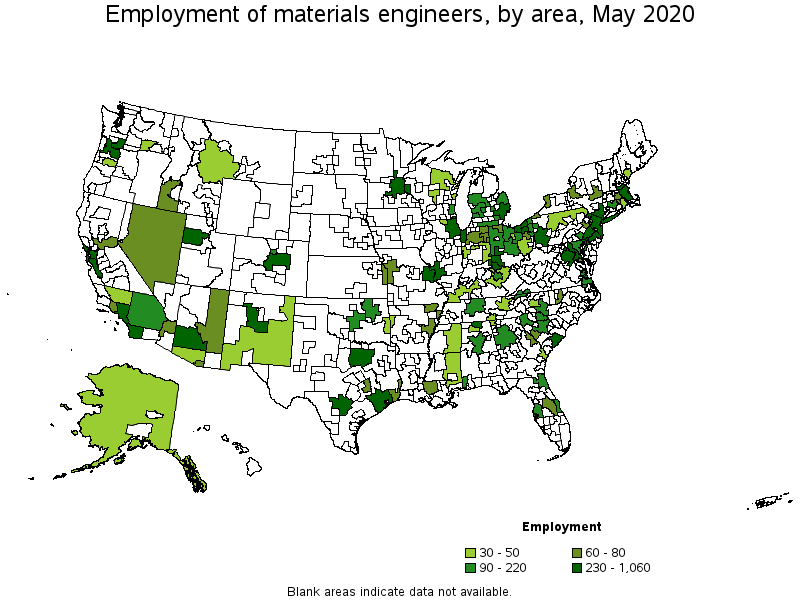
Metropolitan areas with the highest employment level in Materials Engineers:
| Metropolitan area | Employment (1) | Employment per thousand jobs | Location quotient (9) | Hourly mean wage | Annual mean wage (2) |
|---|---|---|---|---|---|
| Los Angeles-Long Beach-Anaheim, CA | 1,060 | 0.18 | 1.02 | $ 54.66 | $ 113,690 |
| Houston-The Woodlands-Sugar Land, TX | 720 | 0.24 | 1.36 | $ 61.30 | $ 127,510 |
| New York-Newark-Jersey City, NY-NJ-PA | 600 | 0.07 | 0.38 | $ 50.81 | $ 105,680 |
| Philadelphia-Camden-Wilmington, PA-NJ-DE-MD | 580 | 0.22 | 1.21 | $ 51.48 | $ 107,070 |
| St. Louis, MO-IL | 530 | 0.41 | 2.28 | $ 44.04 | $ 91,600 |
| Detroit-Warren-Dearborn, MI | 520 | 0.29 | 1.64 | $ 40.33 | $ 83,900 |
| Washington-Arlington-Alexandria, DC-VA-MD-WV | 510 | 0.17 | 0.95 | $ 64.68 | $ 134,530 |
| Dallas-Fort Worth-Arlington, TX | 500 | 0.14 | 0.79 | $ 50.14 | $ 104,300 |
| Chicago-Naperville-Elgin, IL-IN-WI | 470 | 0.11 | 0.60 | $ 43.46 | $ 90,400 |
| San Jose-Sunnyvale-Santa Clara, CA | 460 | 0.42 | 2.33 | $ 57.63 | $ 119,860 |
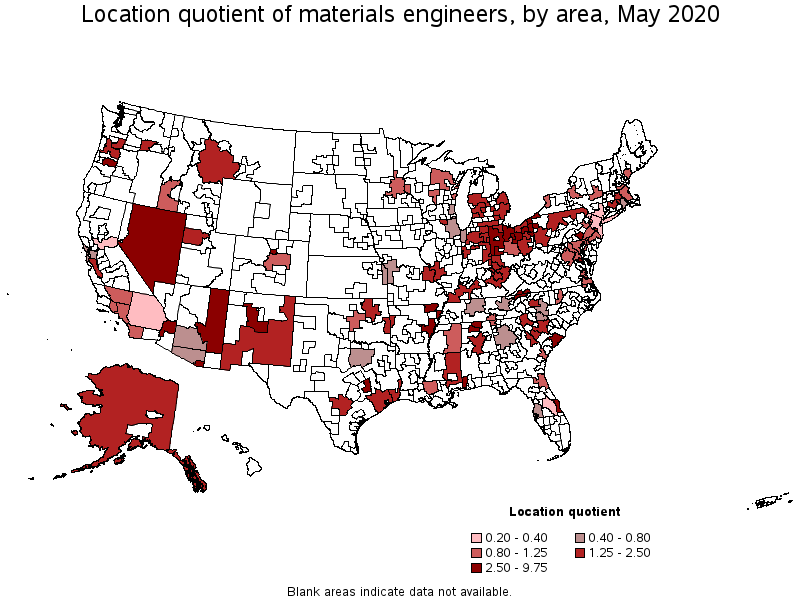
Metropolitan areas with the highest concentration of jobs and location quotients in Materials Engineers:
| Metropolitan area | Employment (1) | Employment per thousand jobs | Location quotient (9) | Hourly mean wage | Annual mean wage (2) |
|---|---|---|---|---|---|
| California-Lexington Park, MD | 80 | 1.74 | 9.75 | $ 58.61 | $ 121,900 |
| Kingsport-Bristol-Bristol, TN-VA | 160 | 1.48 | 8.33 | (8) | (8) |
| Huntsville, AL | 330 | 1.45 | 8.15 | $ 51.21 | $ 106,510 |
| Boulder, CO | 170 | 0.91 | 5.12 | $ 63.22 | $ 131,510 |
| Mansfield, OH | 40 | 0.91 | 5.10 | $ 41.05 | $ 85,380 |
| Dayton, OH | 320 | 0.89 | 5.01 | $ 56.70 | $ 117,930 |
| Albany, OR | 40 | 0.89 | 4.98 | $ 49.75 | $ 103,480 |
| Charleston-North Charleston, SC | 300 | 0.87 | 4.88 | (8) | (8) |
| Akron, OH | 250 | 0.79 | 4.43 | $ 45.28 | $ 94,180 |
| Mobile, AL | 130 | 0.79 | 4.42 | $ 40.83 | $ 84,920 |
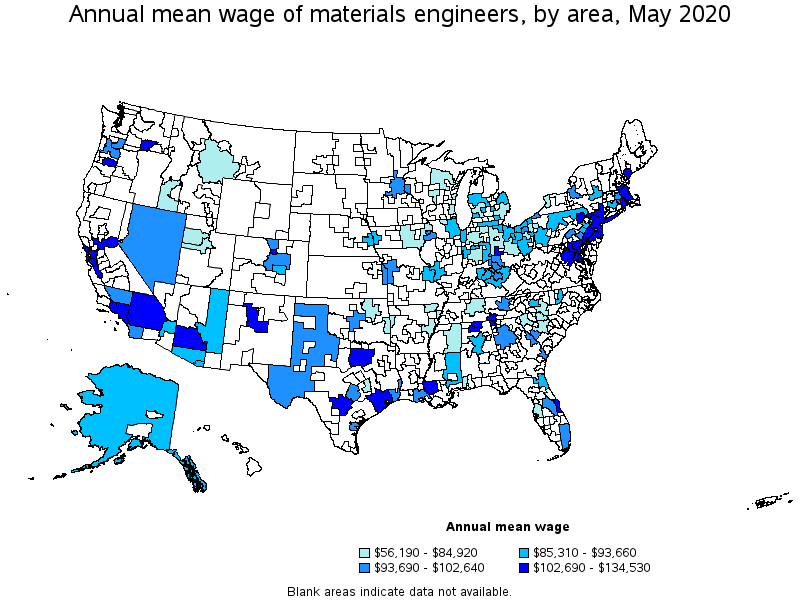
Top paying metropolitan areas for Materials Engineers:
| Metropolitan area | Employment (1) | Employment per thousand jobs | Location quotient (9) | Hourly mean wage | Annual mean wage (2) |
|---|---|---|---|---|---|
| Washington-Arlington-Alexandria, DC-VA-MD-WV | 510 | 0.17 | 0.95 | $ 64.68 | $ 134,530 |
| Boulder, CO | 170 | 0.91 | 5.12 | $ 63.22 | $ 131,510 |
| Albuquerque, NM | 240 | 0.64 | 3.57 | $ 62.72 | $ 130,470 |
| Houston-The Woodlands-Sugar Land, TX | 720 | 0.24 | 1.36 | $ 61.30 | $ 127,510 |
| Baltimore-Columbia-Towson, MD | 200 | 0.16 | 0.88 | $ 59.19 | $ 123,110 |
| California-Lexington Park, MD | 80 | 1.74 | 9.75 | $ 58.61 | $ 121,900 |
| Kennewick-Richland, WA | 40 | 0.32 | 1.82 | $ 58.58 | $ 121,840 |
| San Jose-Sunnyvale-Santa Clara, CA | 460 | 0.42 | 2.33 | $ 57.63 | $ 119,860 |
| Dayton, OH | 320 | 0.89 | 5.01 | $ 56.70 | $ 117,930 |
| Baton Rouge, LA | 60 | 0.16 | 0.92 | $ 55.19 | $ 114,800 |
Nonmetropolitan areas with the highest employment in Materials Engineers:
| Nonmetropolitan area | Employment (1) | Employment per thousand jobs | Location quotient (9) | Hourly mean wage | Annual mean wage (2) |
|---|---|---|---|---|---|
| West Northwestern Ohio nonmetropolitan area | 150 | 0.64 | 3.61 | $ 37.34 | $ 77,670 |
| North Northeastern Ohio nonmetropolitan area (noncontiguous) | 150 | 0.47 | 2.66 | $ 41.02 | $ 85,310 |
| Balance of Lower Peninsula of Michigan nonmetropolitan area | 100 | 0.42 | 2.35 | $ 42.23 | $ 87,830 |
| Arizona nonmetropolitan area | 80 | 0.84 | 4.72 | $ 43.49 | $ 90,460 |
| Nevada nonmetropolitan area | 70 | 0.78 | 4.38 | $ 46.65 | $ 97,040 |
Nonmetropolitan areas with the highest concentration of jobs and location quotients in Materials Engineers:
| Nonmetropolitan area | Employment (1) | Employment per thousand jobs | Location quotient (9) | Hourly mean wage | Annual mean wage (2) |
|---|---|---|---|---|---|
| East Arkansas nonmetropolitan area | 70 | 1.06 | 5.98 | $ 36.33 | $ 75,560 |
| Arizona nonmetropolitan area | 80 | 0.84 | 4.72 | $ 43.49 | $ 90,460 |
| Nevada nonmetropolitan area | 70 | 0.78 | 4.38 | $ 46.65 | $ 97,040 |
| West Northwestern Ohio nonmetropolitan area | 150 | 0.64 | 3.61 | $ 37.34 | $ 77,670 |
| North Northeastern Ohio nonmetropolitan area (noncontiguous) | 150 | 0.47 | 2.66 | $ 41.02 | $ 85,310 |
Top paying nonmetropolitan areas for Materials Engineers:
| Nonmetropolitan area | Employment (1) | Employment per thousand jobs | Location quotient (9) | Hourly mean wage | Annual mean wage (2) |
|---|---|---|---|---|---|
| Nevada nonmetropolitan area | 70 | 0.78 | 4.38 | $ 46.65 | $ 97,040 |
| West Texas Region of Texas nonmetropolitan area | (8) | (8) | (8) | $ 46.26 | $ 96,230 |
| Central Kentucky nonmetropolitan area | 40 | 0.26 | 1.48 | $ 44.84 | $ 93,260 |
| Northern Pennsylvania nonmetropolitan area | 30 | 0.22 | 1.25 | $ 44.39 | $ 92,330 |
| Eastern Ohio nonmetropolitan area | 40 | 0.31 | 1.75 | $ 43.49 | $ 90,460 |
These estimates are calculated with data collected from employers in all industry sectors, all metropolitan and nonmetropolitan areas, and all states and the District of Columbia. The top employment and wage figures are provided above. The complete list is available in the downloadable XLS files.
The percentile wage estimate is the value of a wage below which a certain percent of workers fall. The median wage is the 50th percentile wage estimate—50 percent of workers earn less than the median and 50 percent of workers earn more than the median. More about percentile wages.
(1) Estimates for detailed occupations do not sum to the totals because the totals include occupations not shown separately. Estimates do not include self-employed workers.
(2) Annual wages have been calculated by multiplying the hourly mean wage by a "year-round, full-time" hours figure of 2,080 hours; for those occupations where there is not an hourly wage published, the annual wage has been directly calculated from the reported survey data.
(3) The relative standard error (RSE) is a measure of the reliability of a survey statistic. The smaller the relative standard error, the more precise the estimate.
(8) Estimate not released.
(9) The location quotient is the ratio of the area concentration of occupational employment to the national average concentration. A location quotient greater than one indicates the occupation has a higher share of employment than average, and a location quotient less than one indicates the occupation is less prevalent in the area than average.
Other OEWS estimates and related information:
May 2020 National Occupational Employment and Wage Estimates
May 2020 State Occupational Employment and Wage Estimates
May 2020 Metropolitan and Nonmetropolitan Area Occupational Employment and Wage Estimates
May 2020 National Industry-Specific Occupational Employment and Wage Estimates
Last Modified Date: March 31, 2021